The only ''crime'' my Phuketwan colleague Chutima Sidasathian and I have committed is to report what's been happening in Thailand to the stateless Rohingya.
We've been doing our job. We've been telling the truth. So, for that matter, has Reuters news agency and many other other news outlets.
For reasons that have yet to be made public, our combined coverage has apparently alarmed the Royal Thai Navy to the point where they've sued us, using criminal defamation and the Computer Crimes Act.
This, then, is an unusual piece of Thai military history. A battle fought in court to silence the voices of democracy.
As I write, military history is in my mind. Both my grandfathers were at Gallipoli, the first battle that the relatively young nations of Australia and New Zealand fought in World War I.
It's an occasion that will be commemorated tomorrow, the 99th anniversary.
My grandfathers and thousands of others fought for liberty and free speech. They fought for a better world for their children and their children's children.
Many gave their lives. Others, like both my grandfathers, were wounded in battle.
In the context of the role that the military usually plays in upholding democracies, I have to ask: what is the Royal Thai Navy thinking?
By suing the media, the Royal Thai Navy is clearly not in favor of free speech.
And by staying silent and secretive about what is happening to the Rohingya boatpeople off the coast and inside Thailand, the Royal Thai Navy clearly does not want the citizens of Thailand - or the world - to know what it is doing.
For a grandson of true warriors, I feel saddened that a good organisation - and the Royal Thai Navy is a good organisation - has chosen to use these bad laws, laws that do not exist in other democracies.
The Royal Thai Navy is fighting in defence of . . . what?
Free speech? Hardly. Silence and secrecy are the guardians of dictatorships. And the key question is this: How can we possibly know whether the Royal Thai Navy has a reputation worth defending unless we know the truth about what is happening to the Rohingya?
INSIDE the cell I look around, and it's not pleasant. I do a quick count. There are 36 men I can see, and one I can smell. He's on the toilet, one of two with half-doors that don't hide a lot.
Most of the men are in Phuket Prison garb. The inmates all have shackles around their ankles. Heavy metal makes movement difficult, so most use a string attached to the chain that runs between their ankles to make getting around easier.
The bars of the cells are almost entirely covered in mesh, limiting the hazards for the jailers.
I look around and can see just one man who looks like an expat. He's sitting on a bench. I move in that direction.
As I get close, I realise who it is. It's Stein Dokset, a former Phuketwan commenter who now faces serious charges in the Body in the Bin case. I introduce myself and we shake.
Soon, the guy sitting alongside Stein moves and I sit down.
My white shirt and tie contrast not only with Stein's outfit, but with everyone in the room. They are clearly curious about this farang.
For the next few hours, Stein and I chat.
He does not know about the loss of MH370 and the frantic search for debris, or the Korean ferry disaster. The world, he tells me, becomes very narrow inside Phuket Prison.
I mention some names: Fanelli, Lee Aldhouse, the Swedish pair Tommy Viktor and Johan Sebastian, all of them involved in noteworthy murders.
In Stein Dokset's case, murder is no longer the issue but accidental death. Yes, he killed his girlfriend. Yes, he hid her body in a wheelie bin until it was found three years later.
But was it murder? No, he says, definitely an accident.
Having served 25 months, he hopes the case will conclude this year or early next year and he will be free again. He's at the court today on an unrelated matter.
Over the next few hours, he tells me in great detail what life is like in Phuket Prison. It is not pleasant.
We have one mutual acquaintance, former Phuket police volunteer Garry Halpin, who is being held pending trial on drugs charges. Garry sleeps with just one other person between he and Stein Dokset.
''Sleep'' is probably the wrong word. With 2700 prisoners in a jail built to hold 750, there is little room for sleep.
The Norwegian and New Zealander Halpin share the cell with about 300 others. He shows me on the floor how little space each man has to sleep.
''It's impossible,'' he says. ''My shoulders are broader than my sleeping space,'' he says.
''So like everybody else, I have to lie on one side, in a long row. When one person turns over, we all have to turn over.''
He says it's also impossible to stretch out your legs because the next row is too close.
How long are the inmates in Phuket Prison kept in their dormitories each day? ''Fifteen hours,'' he says.
Food and water are not easy to come by. According to Mr Dokset, anyone who eats just prison food loses a lot of weight quickly.
He has enough money to be able to buy food. Prisoners, he says, can spend up to 9000 baht a month.
Then there's water . . . each prisoner is allowed four litres to wash in each day, he says. Put you dip in the water to try to take a fifth, and look out. Prison guards do not carry long staves for show.
He was lucky just yesterday, he says. He found enough water to shave in before his court appearance.
I stand up on the bench to see into the women's cell next door, through a high mesh grate. A rubber band flicked by another inmate hits me in the back.
The atmosphere in the holding cell is cooperative. Everybody here shares a bond.
As the hours wear on, more prisoners arrive from Phuket's police stations, often with three people whose wrists are locked with the same cuffs and chain.
By 4pm, there are 90 men in the cell and the air is hot and heavy.
I've seen the dormitories on dawn raids at Phuket Prison and I know what Stein Dokset says is true.
But I've also seen the Rohingya behind bars in Thailand, confined so they can't stretch, not just for 15 hours but for 24 hours, so that after many months when they are eventually freed, some men cannot walk and others are bent double.
They are lucky. Others have died.
Freedom is worth fighting for, and on this day it comes for me after just five hours.
SO I SAY to the Royal Thai Navy: Do your worst, do your worst. I know what freedom and democracy mean, and I won't give them up without a fight.
Phuketwan journalists Alan Morison and Chutima Sidasathian appear in court facing seven years' jail on May 26. The Royal Thai Navy has yet to accept an offer to explain its approach to media freedom and the Rohingya boatpeople in Phuketwan.

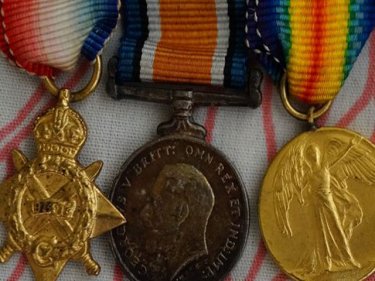







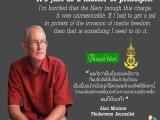

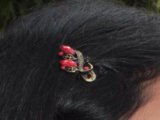
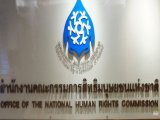
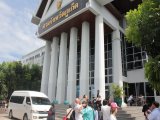

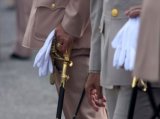

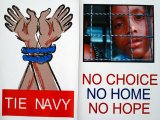








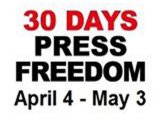
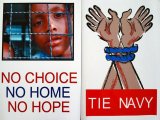

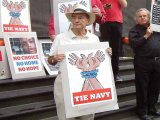


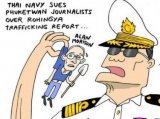



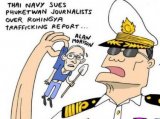
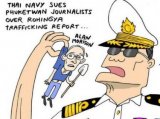
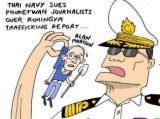





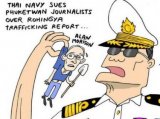
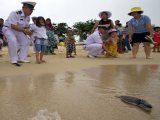

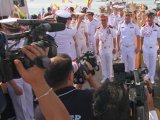




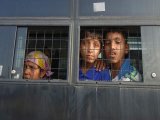

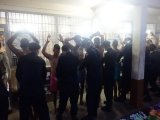


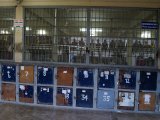
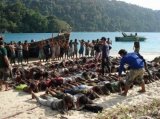




We are very proud of strong will and determination of two freedom fighter journalists of Phuketwan .We ,the freedom loving people ,have to learn a lot from them . After passing five hours at crowed dirty cell Mr. Alan Morison said "Freedom is worth fighting for, and on this day it comes for me after just five hours. SO I SAY to the Royal Thai Navy: Do your worst, do your worst. I know what freedom and democracy mean, and I won't give them up without a fight." I endorsed and noted their feeling because of seven years their ground works of dying Rohingya boat people . They witnessed various types of tragedies that inspired their moral duties to work for humanity . I wish long lives of two freedom fighters for press and humanity !
Posted by Maung Kyaw Nu,Burmese Rohingya Association in Thailand ,BRAT. on April 24, 2014 22:12